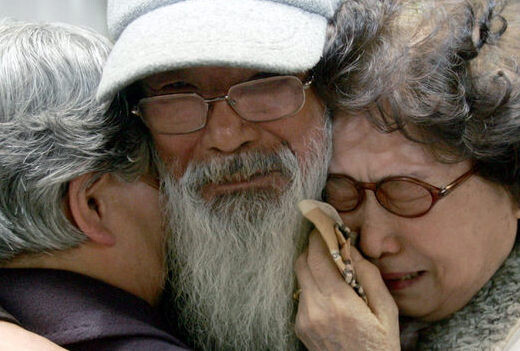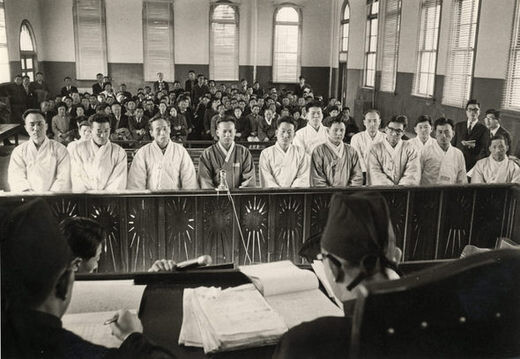hankyoreh
Links to other country sites 다른 나라 사이트 링크
8 men, executed as spies, are found innocent

On April 9, 1975, Lee Yeong-gyo, a mother of five, was headed for Seodaemun Prison in western Seoul where her husband, Ha Jae-wan, then 42, was on death row. He had been sentenced for his involvement in the so-called "Inhyeokdang Jaegeonwi" incident, charged for allegedly trying to reorganize that once-disbanded People’s Revolutionary Party to overthrow the authoritarian Park Chung-hee government.
About a year ago, her husband had gone out to take a dip at a public bath, but never returned home. Lee had tried to find her husband, but her efforts were in vain. The next time he appeared before her, three months had passed and he was wearing prisoner’s garb, sitting in the defendent’s chair in a martial court.
Lee could not imagine her husband would die, even though he had received a death sentence. But upon her arrival at Seodamun prison on April 9, she was told that he had been hanged at dawn. It happend not even a day after his sentencing. When she was told, she went out of her mind.
The Inhyeokdang Jaegeonwi incident has been cited as one of the major conspiracies premeditated by the Park Chung-hee government, which took office through a military coup. In 1974, a pro-democracy organization distributed fliers on campus opposing Park’s autocracy. It prompted the government to take "emergency measures" in April next year, arresting those who were reportedly involved in the organization on charges of attempting to overthrow the government with the help of North Korea.
Eight were sentenced to death for violating the National Security Law and conspiring to overthrow the government. Their executions were carried out in an unprecedentedly swift fashion, just 18 hours after the sentencing.

On January 23 of this year, Lee showed up in a Seoul court, where a retrial of her husband was to take place. It was 32 years after his execution; she is now well over 70 years old. Presiding judge Mun Yong-seon posthumously acquitted all of the eight men of all charges brought against them, ruling that their confessions had been coerced or tortured out of them and that the conspiracy plot never existed. Lee burst into tears.
After the ruling, she didn’t avoid talking to reporters about her long, difficult life. After her husband’s death, she said, "I have kept myself alive, taking meals just as one would chew on sand."
Lee has had to suffer the weight of being stigmatized as a wife of a pro-communist sympathizer. She moved many times, but the rumor of her husband being a famous communist agent always caught up with her quickly. Lee could endure the suffering, but she could not bear to see her children being taunted as "sons and daughters of a pro-communist agent."
"At first, we managed to make a living by selling our house and depending on savings. But that money didn’t last long. I had to go out to make money by peddling and making clothes day and night," Lee recalled. "But what hurt me the most was the cold shoulder given all the time by my neighbors, rather than the dire poverty."
Even relatives cut off their visits to her one day. it was as if she were on an island without any human beings to communicate with. Her neighbors’ attidude toward her family was so toxic that the children around the neighborhood staged a mock trial, trying to string up her seven-year-old son by his neck. Add to all of this the constant watching by agents from the national security agency, "overseeing" the family of a convicted communist agent. Strange men lingered around her home. Her family was barred from leaving their home any time the U.S. president visited South Korea.
But Lee and her family survived. She could not be complacent while trying to raise her children properly. She decided to clear the air surrounding her family’s name. She began to meet the families of the other executed men, and they sought the help of lawyer Kim Hyeong-tae and Reverend Moon Jeon-hyeon. In 2005, the widows were finally given the chance to see their husbands retried.
Several of the deceased men’s families also appeared at the court sentencing; several collapsed after the acquittal was read.
Sin Dong-uk was fired as a elementary school teacher after her husband, Lee Su-byeong, was among those executed in the Inhyeokdang Jaegeonwi incident. "I had not have many chances to talk to other people after my husband was ruled as being a pro-North Korea agent, so now I have problems even communicating with others," she added.
Sin said that the acquittal would be a chance to shed light on all dubious deaths during the 1970s-80s authoritarian rule, and hoped that "first and foremost, the reunification of Korea, which my husband so wanted, will be realized as soon as possible."
Please direct questions or comments to [englishhani@hani.co.kr]
Editorial・opinion
![[Editorial] Does Yoon think the Korean public is wrong? [Editorial] Does Yoon think the Korean public is wrong?](https://flexible.img.hani.co.kr/flexible/normal/500/300/imgdb/original/2024/0417/8517133419684774.jpg) [Editorial] Does Yoon think the Korean public is wrong?
[Editorial] Does Yoon think the Korean public is wrong?![[Editorial] As it bolsters its alliance with US, Japan must be accountable for past [Editorial] As it bolsters its alliance with US, Japan must be accountable for past](https://flexible.img.hani.co.kr/flexible/normal/500/300/imgdb/original/2024/0417/6817133413968321.jpg) [Editorial] As it bolsters its alliance with US, Japan must be accountable for past
[Editorial] As it bolsters its alliance with US, Japan must be accountable for past- [Guest essay] Amending the Constitution is Yoon’s key to leaving office in public’s good graces
- [Editorial] 10 years on, lessons of Sewol tragedy must never be forgotten
- [Column] A death blow to Korea’s prosecutor politics
- [Correspondent’s column] The US and the end of Japanese pacifism
- [Guest essay] How Korea turned its trainee doctors into monsters
- [Guest essay] As someone who helped forge Seoul-Moscow ties, their status today troubles me
- [Editorial] Koreans sent a loud and clear message to Yoon
- [Column] In Korea’s midterm elections, it’s time for accountability
Most viewed articles
- 1[Column] The clock is ticking for Korea’s first lady
- 2Samsung barricades office as unionized workers strike for better conditions
- 3[Editorial] When the choice is kids or career, Korea will never overcome birth rate woes
- 4[Guest essay] How Korea turned its trainee doctors into monsters
- 5Why Israel isn’t hitting Iran with immediate retaliation
- 6S. Korea, Japan reaffirm commitment to strengthening trilateral ties with US
- 7Japan officially says compensation of Korean forced laborers isn’t its responsibility
- 8[Editorial] As it bolsters its alliance with US, Japan must be accountable for past
- 9Korea, Japan jointly vow response to FX volatility as currencies tumble
- 10‘Right direction’: After judgment day from voters, Yoon shrugs off calls for change